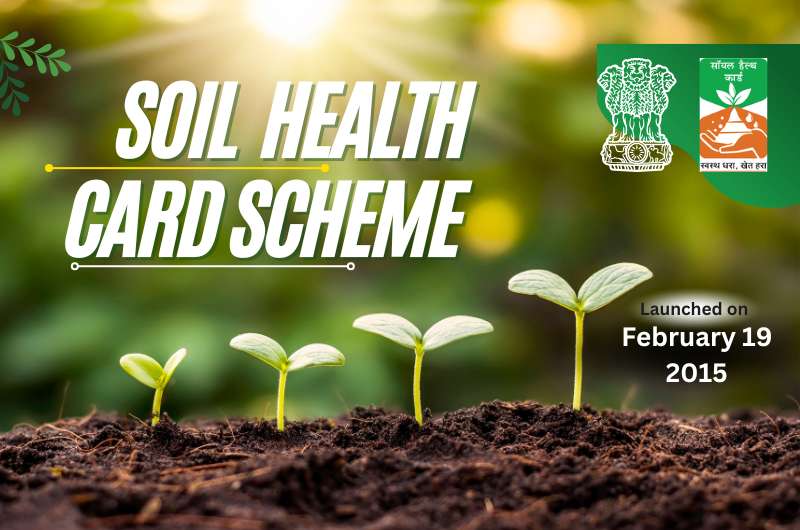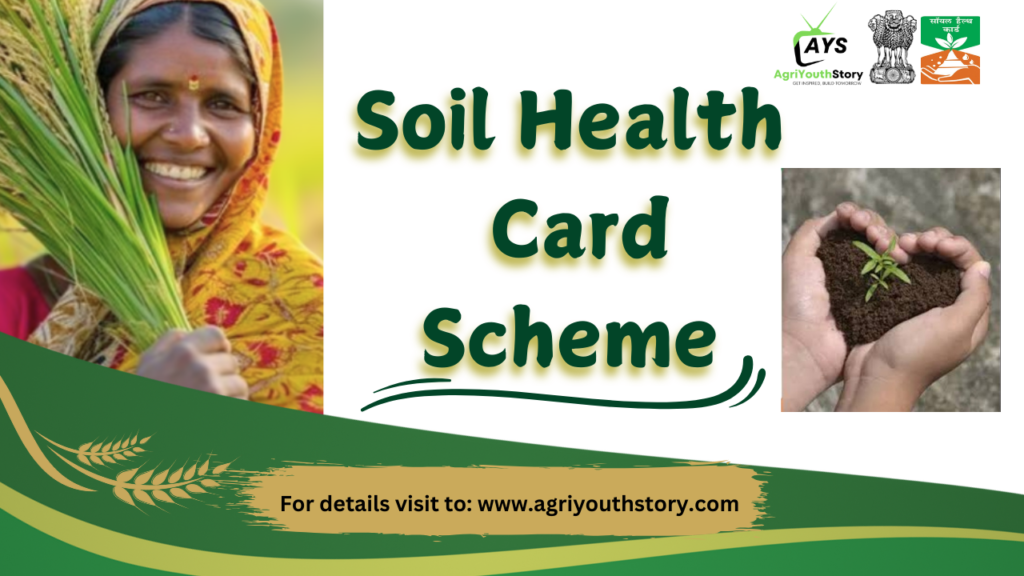


Soil Health Card Scheme

- By agriyouthstory
- (0) comments
- April 3, 2025
Soil Health Card Scheme
In February 2015, the Soil Health Card (SHC) program was launched by the Ministry of Agriculture and Farmers Welfare. The nutrient status of the soil is listed on a soil health card, which also offers suggestions for enhancing the fertility and health of the soil by calculating the needed dosage of nutrients. The Prime Minister established this scheme on 19 February, 2015.
The SHC report, which is printed, provides information on the soil’s nutritional status for each of the following 12 nutrients: pH, Electrical Conductivity (EC), Organic Carbon (OC), Nitrogen (N), Phosphorus (P), Potassium (K), Sulfur (S), Zinc (Zn), Boron (B), Iron (Fe), Manganese (Mn) and Copper (Cu).

Objectives of SHC
1. To provide a basis to address nutrient deficiencies in fertilization practices.
2. To strengthen functioning of soil testing laboratories through capacity building.
3. To develop and promote soil test based nutrient management.
4. To enable farmers access to on-site soil testing facilities.
Key features of SHC
1. According to government plans, all the farmers would take advantage of soil health card those who are under the program.
2. This program is going to be implemented nationwide.
3. Farmers are getting all the essential information regarding their specific farms soil and receive a report in the form of a soil card.
4. Soil cards are issued to farms once every three years.
Drawbacks
1. Inadequate Understanding: Many farmers are unable to understand the content, hence unable to follow the recommended practices.
2. Issues in Collecting Variable Samples: The number of soil samples per unit area are not based on soil variability.
3. Concerns Regarding Coordination: Lack of Coordination among agricultural extension officers and farmers.
4. Lack of Important Aspects: Soil health card does not include essential characteristics like moisture retention and microbial activity.
5. Equal Attentiveness: The soil health card is more focused on chemical nutrient indicators; among physical and biological properties only soil color is included.
6. Exclusion of Important Aspects: Some important indicators are not included in this scheme such as: cropping history, water resources and soil moisture, slope of soil, depth of soil, color of soil, soil texture (bulk density) and micro-biological activity etc.
Initiatives to Improve Soil Health:
1. Organic farming
2. Paramparagat Krishi Vikash Yojana
3. Fertilizer self sufficiency
4. Digital agriculture
5. Carbon farming
6. Nutrient Based Subsidy (NBS) schemes
How does soil health card work?
1. Collect the soil sample from your farm and send it to the laboratory.
2. Professionals test the soil and collect all available information.
3. Following that, they will compile a list of the strengths and weaknesses of the soil.
4. If there is a deficiency in the soil, they provide suggestions for improving the soil and
generate a report.
5. This report is uploaded online for easy access to the farmer.
Information available on soil health card:
The Soil Health Card provides access to the following data:
• The farm’s potential for production
• The availability and shortage of nutrients
• The amount of water in the soil
• List of additional nutrients
Required Documents:
You may need the following documents to register for the Soil Health Card Scheme.
● Aadhar card
● Address proof
● Passbook copy
● Registration form
How to Register Soil Health Card Online:
Here are the steps to register for the Soil Health Card Scheme Online.
Step 1: Click the Registration tab of the Soil Health Card Scheme’s on the official website.
Step 2: Fill out the online registration form and get the unique registration number. The form must be submitted online.
Farmers can verify the status of their soil samples on the website later. They are not required to log in. They can check the condition of the soil by selecting their village name, sub-district, district, state, name and soil registration number. Farmers can also print their Soil Health Card from the internet after registration and certification by the government. There is a tab called ‘Print Soil Health Card and you may get your card in either English or Hindi by clicking on it.
How to download Soil Health Card:
Farmers can visit to government’s website receive the soil health card. They must utilize either their Soil Health Card registration number or phone number. The card can also be downloaded through Har Khet Swasth Khet portal.
These websites can also be used to record soil samples that the department has gathered. You will receive an SMS on your registered mobile number after registering. You can also find out which laboratory examined the soil sample that you sent from your property.
Please visit the official website to stay in touch: https://soilhealth.dac.gov.in/
Email ID: [email protected]
For more details you can contact to these numbers:
● 011-24305591
● 011-24305948

